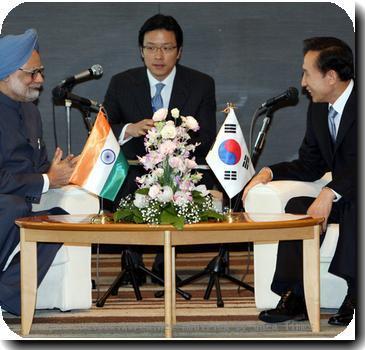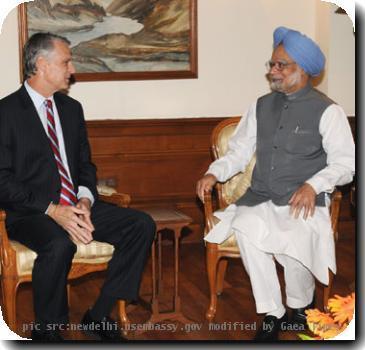‘Receptive’ Pak needs to address India centric concerns, including terrorism
By ANISaturday, June 26, 2010
TORONTO - Officials accompanying Indian Prime Minister Dr. Manmohan Singh for the two-day Group of Twenty (G-20) Summit here, on Saturday said that a more receptive Pakistan needed to be more sensitive in addressing India-centric concerns, including on the issue of terrorism.
Sources said that the recently held foreign secretary-level talks in Islamabad indicated a “climate of receptivity on Pakistan’s part to India’s concerns on various issues.
“The interaction (with the Pakistanis) was much better than what it was in February. We did not find the indifference that prevailed before. This exercise was held with the aim of working out ways to reduce the trust deficit; to create a positive atmosphere and to address all issues in a candid and transparent manner,” the sources said.
They further added that the Indian delegation came away with the sense of Pakistan appreciating the vision of Dr. Manmohan Singh to look for ways to resume the dialogue.
They said the most noticeable change insofar as Pakistan was concerned, was concerned was its repeated emphasis on “having a reasonable discourse; a desire to work towards having a ministerial meeting; to address the issue of terrorism; to work for towards bringing the perpetrators of 26/11 to book.”
As far as the Indian side was concerned, the sources said no effort was spared to emphasize to Pakistan “the gravity of what happened in Mumbai and that this tragic event should not be lost in the Pakistani consciousness.”
India, they added, had placed strong “emphasis on the seriousness it attached to the attack”.
In a sense what came out of the interaction with the Pakistanis was their desire to take “measured steps”; to concentrate on what was “doable”, the sources said.
“In a sense, we have been able to reverse the level of difficulty. Pakistan appeared to be more onboard about discussing India-centric issues,” the sources said.
When asked whether the issue of handing over alleged 26/11 mastermind Hafiz Saeed figured in the talks, the sources said: We did talk about Hafiz Saeed. We underlined the gravity of the 26/11 attacks, which is so emblematic of the use of terrorism for creating tension and conflict between India and Pakistan.”
The sources said that the message that went out to the Pakistani leadership was that they must not compartmentalize the approach to dealing with the menace of terrorism. Islamabad needed to give due attention to India’s views and concerns on the 26/11 probe, they added.
To a question on what they felt was bothering Pakistan so much as to prevent it from taking the next step forward, the sources said that New Delhi’s relationship with Islamabad admittedly was a very difficult and complex one, but the impression that Pakistan gave was that it was intent on “re-engaging with us.”
“They talked about cooperating on counter-terrorism. We (India) told them that the Joint Mechanism on Terrorism inked between the two countries two years ago, has not worked so far. They appeared to pick up on Indian phraseology frequently like ‘doable’ and ‘achievable’, and even referred to our Prime Minister’s words of talks being ‘ a process of mutual comprehension’,” the sources said.
“We must understand and reflect that this relationship is struggling to survive. We felt that we got their attention. They responded to some of our ideas. Our effort over the next few months would be to convince Pakistan to address India-centric issues of this relationship,” they added.
The sources further said that what must not be ignored is the fact that Pakistan does feel quite challenged by India’s achievements in various sectors, though they won’t naturally admit it.
“They are a proud country, but they do know that the gap (socio-economic and political) vis-’-vis India is widening,” the sources said.
India’s relationship with Pakistan cannot be dealt with or seen in a monochromatic way, and there were no simplistic solutions to improving bilateral ties, the sources said.
They further added that there is a perceptible and tactile shift in the interaction with Pakistan, and therefore, there is reason to be optimistic and positive.
To a question related to prisoners of war (POWs), the sources said: “We should focus on the missing defence personnel on both sides.” By Ashok Dixit (ANI)

